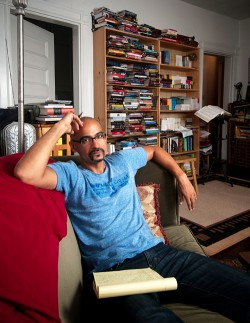Few first-time novelists have made a larger splash than Junot Diaz did with The Brief Wondrous Life of Oscar Wao, which won the Pulitzer Prize and received widespread critical acclaim and commercial success.
A rock star of American fiction

Few first-time novelists have made a larger splash than Junot Diaz did with The Brief Wondrous Life of Oscar Wao, which won the Pulitzer Prize and received widespread critical acclaim and commercial success.
“Junot Diaz is one of the best-known and best-loved writers of his generation, a rock star of contemporary American fiction,” said Leni Zumas, a Portland State English professor
Much like the titular character of his 2007 novel, Diaz was born in the Dominican Republic, emigrated to New Jersey when he was young and grew up devouring comics and science fiction. Both went to Rutgers College and lived in the same dormitory on campus.
Oscar Wao is an exploration of alienation and connection, of a clashing multicultural world populated by painful history and popular culture.
Diaz will visit Portland State Monday, April 30 to deliver the keynote at this year’s Nina Mae Kellogg Awards Ceremony. The awards, which celebrate their 48th anniversary this year, recognize outstanding student achievements in writing and literary studies.
“It’s phenomenal for an organization or school to take a moment and honor the arts and artists,” Diaz said. “This is an important thing for everyone.”
Diaz’s first collection of short stories, Drown, which also received rave reviews, was released in 1996. But Diaz accepts that he isn’t the most prolific author.
“To be honest, you can only write what you can write,” he said. “If you’ve have a book in you and it takes 11 years, then that’s what it takes.”
Diaz writes between three and four hours a day, but doesn’t end up using much of it: “It’s kind of nuts; I just have to write a lot of crap for anything good to come out,” he said.
Fortunately, readers won’t have to wait as long this time. Earlier this year, Diaz announced that his second collection of short fiction, This is How You Lose Her, will be released this September by Riverhead Books.
“Almost all of the stories have heartbreak and love at their center,” Diaz said. “I feel like anyone my age, 43, who’s never been married knows a thing or two about crazy relationships. I felt connected to this idea of finding ourselves through intimacy and love.”
The Kellogg awards provide more than $17,000 in prizes and scholarships to PSU English majors and graduate students in English and writing who have demonstrated academic excellence.
“The ceremony is a highlight of the year for the English department,” said Zumas, who sits on the awards committee. “[It] is a fantastic educational resource for non-PSU audience members as well as for our students and faculty.”
The ceremony is free and open to the public. Zumas said she hopes that Diaz’s celebrity will attract a large, diverse audience.
Diaz knows his way around literary awards. Not only has he won the Pulitzer; he was elected to its board in 2010. This year, for the first time in 35 years, there was no Pulitzer awarded for fiction, a move that has been met with much ire. And while Diaz avoided directly discussing the reasons behind the board’s decision, he is clearly unhappy.
“What’s most heartbreaking about situations like the Pulitzer is that we rarely get opportunities to honor literature and fiction,” he said. “It’s a catastrophe.”
Diaz’s concern grows out of his fear that fiction, as well as many arts, is quickly losing its distinguished cultural position: “I think the position of arts in civic space has been almost entirely eroded,” he said. “It has become absolutely necessary for the arts to fight for every inch it gets.”
He sees literary awards as opportunities to refocus public attention: “The best dimension of any award for arts is that it’s an opportunity to celebrate something that is not often celebrated,” he said.
In addition to being a critically acclaimed, award-winning author, Diaz is also a professor of creative writing at the Massachusetts Institute of Technology, a place he finds both challenging and thrilling.
“These kids are brilliant and kooky. They know a lot of wonderful shit,” he said. “Working at MIT makes every victory you have a big one. My students are overwhelmingly more focused on practical studies. It’s really extraordinary to convince a student like that that the arts are not only important to society but also to them.”
Monday, April 30
5:30–7:30 p.m.
Smith Memorial Student Union Ballroom (room 355)
Free and open to the public






